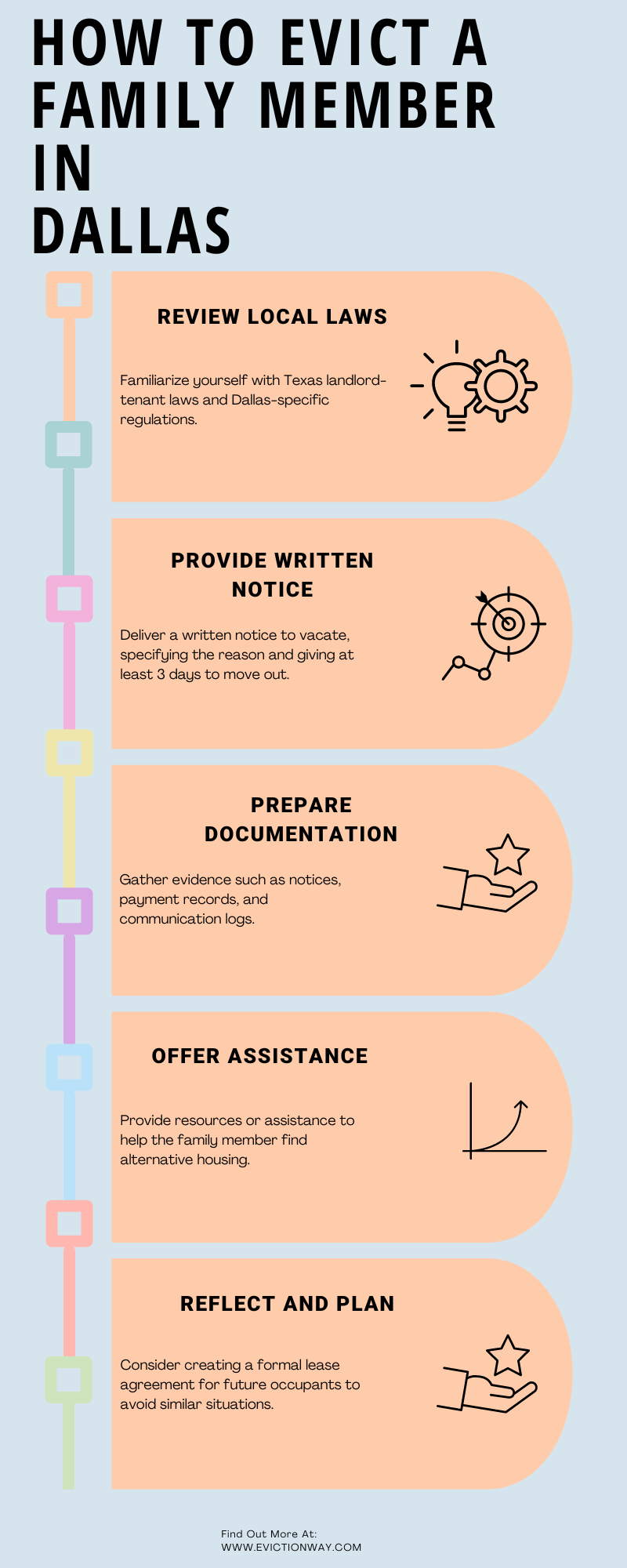When it comes to evicting a family member in Dallas, there are specific steps you need to take. We’ll walk you through the process, providing you with the information you need to proceed legally and respectfully.
First, it’s crucial to understand the legal grounds for eviction. In Dallas, you can evict a family member if they have violated the terms of their tenancy, such as not paying rent or damaging the property. We’ll provide you with the necessary steps to follow, including serving a notice to vacate and filing an eviction lawsuit if necessary.
Additionally, we’ll offer tips on how to approach the situation with sensitivity and respect. Evicting a family member can be emotionally challenging, so we’ll guide you on communicating your decision effectively and minimizing any potential conflict. We’ll also discuss the legal implications of the eviction process and provide resources for seeking legal assistance if needed.

How To Evict a Family Member In Dallas
Evicting a family member is never easy, but it may be necessary to protect your rights and property. If you’re considering evicting a family member in Dallas, here are six steps you can take:
1. Talk to Your Family Member
The first step is to talk to your family member about the situation. Explain your reasons for wanting them to move out, and see if you can come to an agreement. If you can’t reach an agreement, you may need to move on to the next step.
2. Give Written Notice
If you can’t come to an agreement with your family member, you’ll need to give them written notice to vacate the property. The notice should state the date by which they must move out, and it should be signed and dated by you.
3. File for Eviction
If your family member doesn’t move out by the date specified in the notice, you can file for eviction. You can do this by filing a complaint with the Justice of the Peace Court in the county where the property is located.
4. Attend the Eviction Hearing
Once you’ve filed for eviction, you’ll need to attend a hearing. At the hearing, you’ll need to present evidence to support your claim for eviction. Your family member will also have the opportunity to present their case.
5. Get a Judgment
If the judge rules in your favor, you’ll be granted a judgment for eviction. This judgment will give you the legal authority to remove your family member from the property.
6. Enforce the Judgment
Once you have a judgment for eviction, you can enforce it by hiring a constable to remove your family member from the property. The constable will post a notice of eviction on the property, and your family member will have a certain amount of time to move out. If they don’t move out by the deadline, the constable will forcibly remove them.

Additional Resources for Dallas, Texas eviction help:
30 day eviction notice Dallas
In Dallas, a 30-day eviction notice indeed serves as a legal document that landlords can utilize when tenants breach their lease agreements.
This notice essentially notifies tenants that they have thirty days to rectify the violation or vacate the premises. It’s a crucial step in the eviction process and provides tenants with a final opportunity to resolve the issue before further legal action is taken.
You can download 30 day eviction notice Dallas here.
How Much Does it Cost to Evict a Family Member in Dallas?
The financial burden of evicting a family member can vary greatly depending on the specific circumstances of the case. However, there are some general costs that you can expect to incur, such as:
| Fee | Estimated Cost | Notes |
|---|---|---|
| Filing Fee | $54 – $134 | Varies depending on the case type (see details below) |
| Service of Process | $75 – $150 per defendent | By Dallas County Sheriff/Constable |
| Attorney Cost | $200 – $500 per hour | Hourly rate, case complexity |
| Court Costs | Varies | Additional fees depending on case needs |
- Filing fees: The filing fee for an eviction lawsuit in Dallas is $134.
- Service of process: The cost of serving the eviction notice to the tenant can range from $75 to $150 per defendent.
- Attorney fees: If you hire an attorney to represent you in the eviction process, you can expect to pay between $200 to $500 per hour.
- Court costs: If the case goes to trial, you may be responsible for paying court costs, such as witness fees and court reporter fees.
FAQs: Evicting a Family Member in Dallas
Evicting a family member can be a difficult and emotional process. However, it is important to remember that you have rights as a landlord, and you should not feel guilty about protecting your property.If you are considering evicting a family member, it is important to do your research and understand the legal process.
Here are some of the most frequently asked questions about evicting a family member in Dallas:
What are the grounds for eviction in Dallas?
In Dallas, there are several grounds for eviction, including:
- Nonpayment of rent
- Violation of the lease agreement
- Criminal activity
- Nuisance behavior
How do I start the eviction process?
To start the eviction process, you must serve your family member with a notice to vacate. This notice must state the reason for the eviction and the date by which your family member must vacate the property.
What if my family member refuses to leave?
If your family member refuses to leave after being served with a notice to vacate, you can file an eviction lawsuit with the court. The court will then hold a hearing to determine whether or not your family member should be evicted.
Can I evict a family member if they are not on the lease?
Yes, you can evict a family member even if they are not on the lease. However, you must be able to prove that the family member is living in the property without your permission.
Does Texas have a 30-day eviction notice?
Yes, Texas has a 30-day eviction notice for month-to-month leases or when the lease agreement specifies it.
What are my rights as a landlord?
As a landlord, you have the right to evict a family member who is violating the lease agreement or engaging in criminal activity. You also have the right to protect your property from damage or nuisance behavior.
Related:
How to Evict a Family Member in Pembroke Pines
